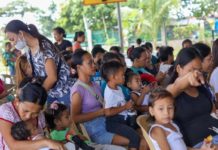
ILOILO – The towns of Carles and Janiuay recorded the highest number of stunted and wasted children aged zero to 59 months in 2023 in this province, data from the Iloilo Provincial Health Office (IPHO) showed.
Stunting, or low height-for-age, reflects chronic or recurrent undernutrition often linked to poverty, poor maternal health, frequent illnesses, or inadequate early-life nutrition and care.
According to the World Health Organization, stunting limits children’s physical and cognitive potential.
On the other hand, wasting – characterized by low weight-for-height – generally indicates severe and recent weight loss and may be caused by insufficient quality and quantity of food or chronic illness.
The IPHO data revealed that out of 148,902 children assessed under Operation Timbang (OPT) Plus last year, 7,204 were found to be stunted while 1,727 were wasted.
The data identified the following towns with the highest numbers of stunted children:
* Carles – 732 out of 6,082 children
* Janiuay – 563 out of 4,945 children
* Dumangas – 422 out of 5,519 children
* Santa Barbara – 377 out of 5,108 children
* Balasan – 342 out of 2,070 children
* Badiangan – 286 out of 1,415 children
* Pototan – 256 out of 5,994 children
* San Rafael – 249 out of 1,328 children
* Lambunao – 244 out of 5,917 children
* Lemery – 220 out of 3,233 children
Meanwhile, the towns with the most wasted children were the following:
* Carles – 250
* Janiuay – 164
* Santa Barbara – 127 out of 5,108 children
* Alimodian – 81 out of 2,224 children
* Lambunao – 77
* San Miguel – 71 out of 1,686 children
* Calinog – 70 out of 4,804 children
* San Enrique – 67 out of 3,368 children
* Pototan – 62
* Leon – 54 out of 3,463 children
According to Dr. Maria Socorro Colmenares-Quiñon, head of IPHO, inadequate nutrition in the first two years of a child ncan lead to irreversible stunting and wasting.
Poverty often restricts families’ ability to purchase nutritious food, leading them to rely on carbohydrates instead of protein, she pointed out.
Quiñon said majority of affected children come from impoverished families unable to afford protein-rich diets.
In response to the high rates of malnutrition, IPHO has continued to extend technical assistance to local government units to develop nutrition programs and plans, including feeding programs. In collaboration with the National Nutrition Council and the World Bank, they also conduct feeding programs for children and pregnant women.
Dr. Wendel Tupas-Marcelo, Provincial Health Officer I, noted that the geographical remoteness of Carles, which includes 18 island barangays among its 33, complicates the delivery of governmental programs and services. This remoteness is considered a significant factor in the high prevalence of stunting and wasting in the area.
To address these nutritional challenges, IPHO is enhancing the implementation of nutrition programs during the first 1,000 days from conception to two years of age, emphasizing the critical window for preventing stunting and wasting./PN



